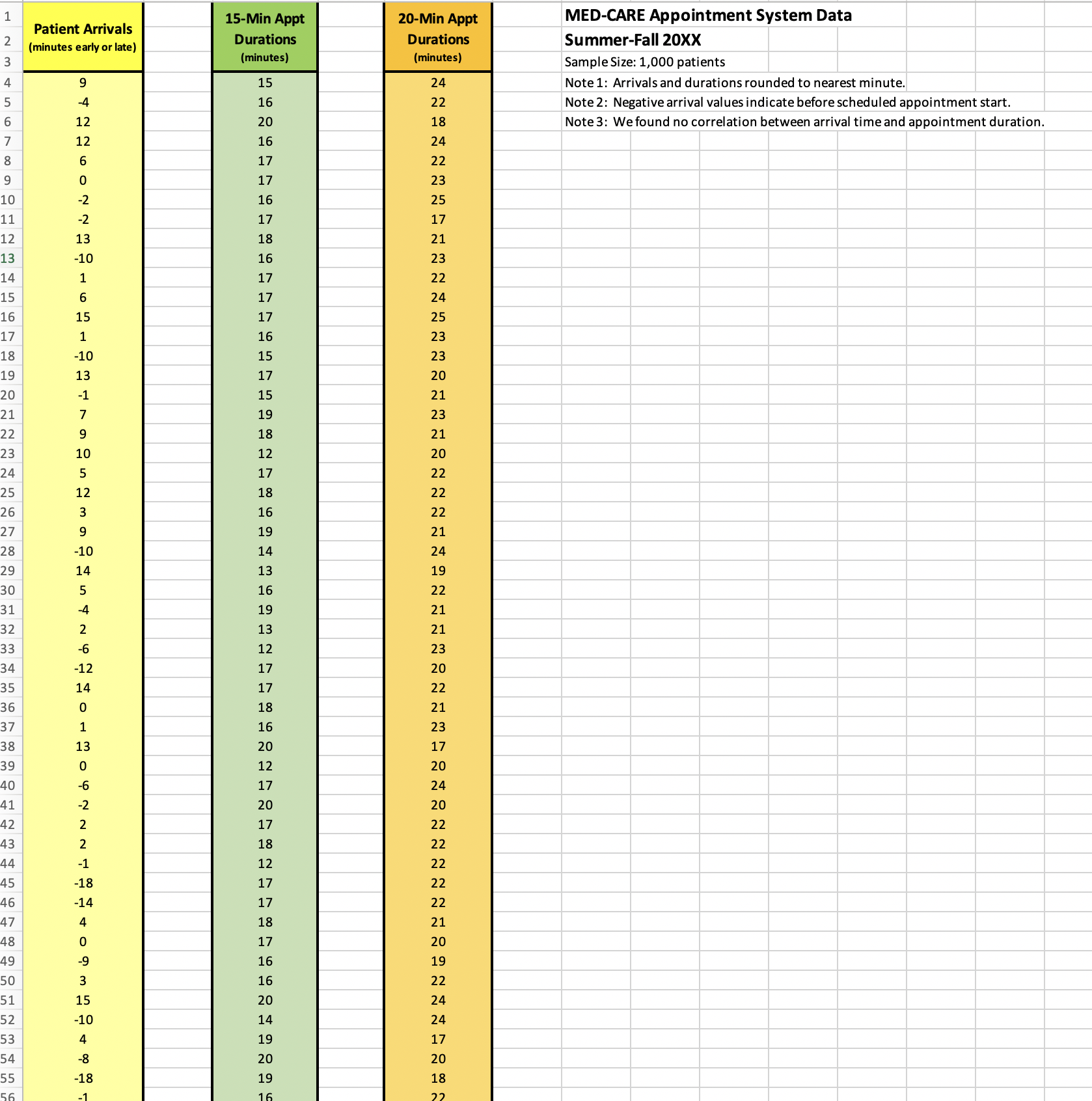Question
Day-Med has requested an analysis of its most widely-used patient appointment scheduling system. The appointment system is designed to serve many Day-Med locations and is
Day-Med has requested an analysis of its most widely-used patient appointment scheduling system. The appointment system is designed to serve many Day-Med locations and is currently being used by 25 doctors and health care professionals. A representative dataset was collected of 1,000 patient arrival times, 500 15-minute appointment times, and 500 20-minute appointment times.
Day-Med has proposed improvements to the system including inserting buffer times, changing the grace period, and tightening up appointment durations.
a. With the new arrivals and appointment duration data give insights towards causes of poor appointment system performance?
b. What is the performance of the current appointment system?
i. What are the average values of Complete, Wait, Idle and Office times?
ii. How often is the Wait time low?
iii. How often is the complete time low?
iv. How often are the measures high?
v. How often do appointments end on time?
c. Can the possible improvements to the system provide significant enhancement to performance?
d. Are there any other pros and cons of the current system versus the improvement?
e. Are there additional insights or recommendations from the analysis?
2. Data and Methods Used
Day-Med has provided representative data on patient arrival times (1,000 data points), real duration of 15-minute appointments (500 data points), and real duration of 20-minute appointments (500 data points). A core simulation model will be created based on the data provided. The model will simulate one day of 16 appointments at Day-Med and assumes that no patients arrive more than 15 minutes late. With the core model, it will then be replicated 1,000 times.

1 15-Min Appt Patient Arrivals 2 Durations (minutes early or late) 3 (minutes) (minutes) 20-Min Appt Durations MED-CARE Appointment System Data Summer-Fall 20XX Sample Size: 1,000 patients 4 5 -4 6 7 8 9 10 -2 11 -2 12 13 14 15 16 17 18 19 20 21 22 23 24 25 26 27 28 29 30 31 32 33 34 35 36 37 38 39 40 41 42 43 44 45 46 47 48 49 50 51 52 53 54 55 242260223216512277205232725726220130622270/74093148 01 15 24 Note 1: Arrivals and durations rounded to nearest minute. 16 22 20 18 Note 2: Negative arrival values indicate before scheduled appointment start. Note 3: We found no correlation between arrival time and appointment duration. 16 24 17 22 17 23 16 25 17 17 18 21 16 23 17 22 17 24 17 25 16 15 17 -1 15 20 21 19 18 12 21 20 17 18 16 19 21 14 13 19 16 -4 19 13 21 -6 12 17 17 18 16 20 12 -6 17 -2 20 17 18 -1 12 17 17 -9 19 -8 -18 56 -1 ANY222229 18 17 16 16 20 14 20 19 16 223322322222222222322232222222222222222222 24 21 20 21 17 20 24 20 21 20 19 24 24 17 20 18
Step by Step Solution
There are 3 Steps involved in it
Step: 1
Analysis of DayMed Appointment System a Insights into Poor Performance Several factors could contribute to poor performance in DayMeds appointment system Patient arrival times If patients frequently a...
Get Instant Access to Expert-Tailored Solutions
See step-by-step solutions with expert insights and AI powered tools for academic success
Step: 2

Step: 3

Ace Your Homework with AI
Get the answers you need in no time with our AI-driven, step-by-step assistance
Get Started


